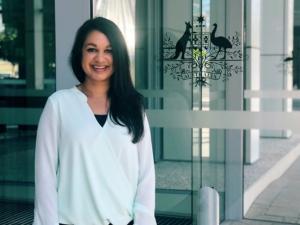Rushika
What were you researching before you started as a Science Policy Fellow?
My research in the field of Immunology focused on T cells and autoimmune disease. Autoimmune diseases arise when a person’s immune system attacks tissues and organs of the body. I studied genetic variants linked to autoimmune diseases and uncovered how pathogenic variants altered the function of T cells. Understanding the genetic basis of disease is important for developing targeted therapies and using a personalised medicine approach to support better health outcomes for patients.
What policy area are you working on through the Science Policy Fellowship Program?
During the Fellowship year I will gain experience within two divisions of the Department of Health. I am currently working within the Medical Benefits Division (MBD), in a variety of policy areas related to specialist medical services listed on the Medicare Benefits Schedule (MBS). My next rotation will be in the Health Economics and Research Division (HERD), working on key initiatives of the Medical Research Future Fund (MRFF).
How has your research background helped you contribute to policy development?
My research background and analytical skills have helped a lot in the transition to working in policy. Like research, policy work requires you to think strategically, synthesise complex information from a variety of sources, assess evidence, write papers and reports, engage with diverse stakeholders and work within a collaborative team to articulate ideas. The opportunity to use my research skills in a variety of contexts and develop evidence-informed health policy is an exciting challenge.
How has the program changed your career aspirations?
My ‘big picture’ career aspiration is to make contributions towards improving health outcomes for individuals. The Department of Health is a great place to work and day-to-day I get to develop new skills in policy, from giving policy advice through to being involved in the implementation of policies endorsed by Government. These new skills and being able to engage with diverse stakeholders have certainly broadened the ways in which I see myself contributing to the health sector. I’m excited to see where the experiences of the Fellowship year could take me into the future.
What is your favourite part about working in a policy role in the Australian Public Service?
I enjoy working on tasks that I know will have a real, direct impact on healthcare in Australia. The work delves into complex, challenging issues and working as a team and with stakeholders to propose innovative solutions, is a fulfilling position to be in. I’m also enjoying being a Science Fellow – we have developed a great network across the APS. In this role I’ve also been able to seek extra opportunities to extend my skills and gain valuable training.

